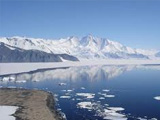Today.Az » Weird / Interesting » Antarctica’s ancient lake may unveil truths about earth
13 October 2011 [10:30] - Today.Az
 A lake concealed under the ice in Western Antarctica may reveal details about the kind of life forms that existed on the planet millions of years ago.
A lake concealed under the ice in Western Antarctica may reveal details about the kind of life forms that existed on the planet millions of years ago.
A team of British scientists and engineers is all set to travel to the Antarctic, for the first stage of an ambitious scientific mission to collect water and sediment samples from a lake buried beneath three kilometers of solid ice.
This extraordinary research project, at the frontier of human exploratory endeavors, should yield new data about the evolution of life on Earth and vital clues about the Earth's past climatic conditions.
Lake Ellsworth is likely to be the first of Antarctica's 387 known sub glacial lakes to be measured and sampled. Scientists will use a specially-designed and manufactured probe, using space-industry standard "clean technology", according to a release from the Lake Ellsworth project team.
For years, scientists have speculated that new and unique forms of microbial life could have evolved and sustained itself, in this cold, pitch-black and isolated environment. Sediments on the lakebed are likely to reveal insights into the history of biological life in the lake and that of the Western Antarctic Ice Sheet (WAIS), including its past collapses.
"We are tremendously excited - this is a frontier science project with engineering and technology at the forefront. Scientists and engineers from two of the Natural Environment Research Council's (NERC) centres of excellence, working in partnership with scientists from eight UK universities, make up the consortium that will search for life in this extreme environment and discover the secrets locked in the sediments. Every piece of equipment is a bespoke design and they have been built in partnership with several UK businesses," said Professor Martin Siegert, the program's Principal Investigator, in a statement.
"Finding life in a lake that could have been isolated from the rest of the biosphere for up to half a million years will tell us so much about the potential origin of and constraints for life on Earth, and may provide clues to the evolution of life on other extraterrestrial environments. If we find nothing, this will be even more significant because it will define limits at which life can no longer exist on the planet," said David Pearce, Science Coordinator at the British Antarctic Survey.
The unique five-meter long water sampling probe was designed and built by engineers at the National Oceanography Centre in Southampton. It is made of the highest grade of titanium to ensure maximum sterility and strength and will hope to collect 24 water samples from different lake depths. It will also capture the top layer of sediments at the lake-floor/water interface.
Scientists at the British Antarctic Survey and the University of Durham, working in partnership with Austrian business organization UWITEC, have designed and built a sediment corer which can extract a core up to three meters long. The unique percussion-driven piston corer is strong enough to penetrate even the most compacted glacial sediments to extract a core sample.
"The knowledge and new understanding of the evolution of life, the Earth's ancient climatic history and the movement of ice sheets that we expect to achieve by this endeavour will make a major contribution to the international research efforts to understand our changing world. The innovative engineering technology that is being developed will lead the way for future explorations," said Steven Wilson, interim Chief Executive for NERC.
In October 2012, a team of ten scientists and engineers will use state-of-the art hot-water drilling technology to make a three kilometer-long hole in the frozen ice over the lake. They will then lower a titanium probe to measure and sample the water, followed by a corer to extract sediment from the lake.
/International Business Times/
|
|